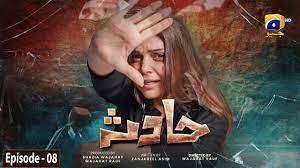
View this post on Instagram
There should be no need for a ban and there ought to be no selection of what is to be banned or not, especially when it comes to the art and the issue being the ‘image of Pakistan’ rather than the well being of the victim in question.
Any ban in our pure land essentially take away freedoms whatever few remain. This specific ban on a televised drama Hadsa as per PEMRA completely misses the point which is of course the need to respect privacy especially in a ghairat/haya/sharm/honour obsessed society like ours, and not to uphold the PR image of the country.
More importantly this ban erodes whatever little room there ever was to conduct a dialogue based on art with regards to what constitutes as entertainment and how acceptable it is to be commodified keeping sensitivity and empathy at the core.
Selective bans are even worse. Who decides what is to be banned and why? In polarised societies where there is a clear lack of rational thought, bans are a dangerous weapon. Not a tool, weapon used to kill off creative expression or any idea that differs from the mainstream and that potentially fuels online violence which increasingly has an offline spill over effect.
Ultimately this ban on the drama does not really resolve anything but as per the PEMRA ordinance it restores some form of honour – to the country, not the victim. So we are really are back to square one where civilians, females in particular, are consistently sacrificed for the country.
Bans act as the final nail in the coffin - where dialogue is needed - effectively indicating that silence is to upheld at all costs, even as offline or online violence carries on.
Instead of the use of a ban as a ‘fix’, what there should be is the generation of the awareness of why the need for a ban arises. Anything that eats away at societal fabric, eroding liberties and risks lives immediately becomes a problem that needs to be solved – why is this happening, what can be done to reduce the damage and most importantly, how do we ensure such things and patterns of behaviour are not repeated.
The root of the problem is the soft legitimisation of the mentality that sees rape as an act of entitlement. We have seen countless times how gender based violent acts are carried out with an attitude that reeks of fearlessness, safe in the knowledge that there will no consequences and that the victim is something to be preyed upon simply for existing.
Due to the lack of a dialogue about the need to uphold the victim’s care, lack of awareness of the sensitivity on how to treat a victim and most importantly to address why the rape is taking place, sexual violence of all forms is fetishized and commodified. This is what needs to be arrested and addressed.
A ban on art – good or bad – effectively kills off any potential dialogue that could be conducted with empathy in the hope of planting the seed of sensitivity.
Context is another issue. Countless true crime dramas, films and documentaries are made globally and Pakistan is no exception.
Is there a need to address the pandemic of rape and other forms of sexual violence in Pakistan? Absolutely.
Can the evilness of such acts be communicated through art (film, drama, theatre, music, literature and more)? Of course.
Must it be put in a personalised context, especially in an honour obsessed society like ours? No.
And this is where this particular drama got it wrong.
Female suffering in all forms sells in Pakistan because it reflects what is happening and it gains legitimacy due to the silence surrounding it refusing to acknowledge the act itself as problematic but focusing on feeding off the victim's suffering as a channel for collective trauma.
Banning a television drama, even for the cost of the country’s PR image, reeks more of a desperate attempt to wrest control over content – taking away focus on the problem of where the content is coming from.
Again, this does not ‘solve’ anything but adds one more layer of conflict in the electronic media which is already riddled with so many problems about what is ‘acceptable’ or not.
Crime dramas are broadcast all over the world. Names and identities are changed to protect victims. However in this particular situation Pakistan more caution could be exercised in the name of sensitivity given the drive to uphold izzat above all. How conveniently izzat was compromised by those who backed the drama but instead of taking it off air, this was where a dialogue could have been conducted on why such a project with zero cultural, societal and/or religious sensitivity was allowed. By all means, address the issue but consider the context.
Instead of bans, it is time the constitution of art was changed. New writers need to be engaged. And victims should be treated with the respect they deserve, not because they pose as a threat to the country’s image but because the country has let them down.

